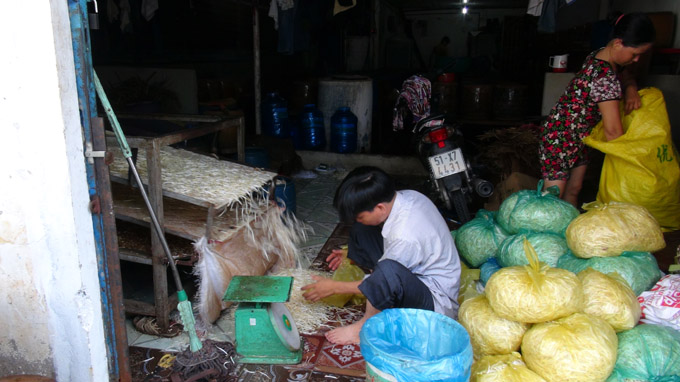Inspectors in Ho Chi Minh City caught two bean sprout producers using Chinese mung beans and chemicals to stimulate the growth of the vegetables and make them look better.
Yesterday a joint inspection team in Tan Phu District raided two unlicensed production establishments located next to each other on Do Thua Luong Street, and caught them using Chinese materials while producing bean sprouts. At one of the two establishments, inspectors found many 50-kg bags of mung beans that are used for producing bean sprouts. There were numerous Chinese words on the bags. Inspectors also discovered two types of chemicals contained in plastic tubes, which also displayed Chinese characters. Do Van Quan, 44, a native of Nam Dinh Province, failed to show any documents related to the foreign beans or chemicals. He said he had bought the mung beans from a trader in Hoc Mon District for VND1.8-1.9 million (US$91) per 50 kg bag. He also explained how he used the Chinese chemicals. “This solution is mixed with water for the bean sprouts. Bean sprouts fed with the solution will be bigger in width without roots and green leaves will sprout. Those fed with smaller mounts of the solution will become longer,” Quan said. “Meanwhile, the white powder chemical is mixed into irrigation water to increase its pH levels, which will help the vegetable be able to be stored longer without rotting.” He also added that “all producers of bean sprouts have to use such chemicals to make their products better in appearance and thereby sell well.” At the other establishment Vu Van Huyen, the owner, was caught using the same mung beans and chemicals. Inspectors seized a total of 40 kg of liquid chemicals and 6.7 kg of powder chemicals without documents from the two establishments. They also sealed the bags of mung beans while waiting for their owners to provide related documents to prove their origin. They also fined each establishment VND20 million (US$960) for using chemicals without origin and VND400,000 for operating without a license.
|
Toxic Chinese ginger found in HCMC? Imported Chinese ginger, which is bigger and looks fresher than the locally grown version, is being sold in markets in Ho Chi Minh City, despite higher prices. Domestic ginger is sold for about VND20,000 (US$,096) a kilogram, while the Chinese spice is priced at VND30,000 a kg, according to traders. About 10 tons of Chinese ginger is transported to the wholesale market in Hoc Mon every day, said Hanh, a wholesaler there. Meanwhile, Vietnamese consumers were shocked to learn of the news released by China Central Television (CCTV) earlier this week that Chinese ginger (in Weifang city) is grown in with a highly toxic pesticide called aldicarb. The pesticide is banned from use on any crops but cotton, tobacco, peanuts, roses and sweet potatoes, according to a report by CCTV. The chemical can cause dizziness, blurred vision, nausea and respiratory failure, and only 50 milligrams of aldicarb is enough to kill a 50-kg person, the report said. |






















































